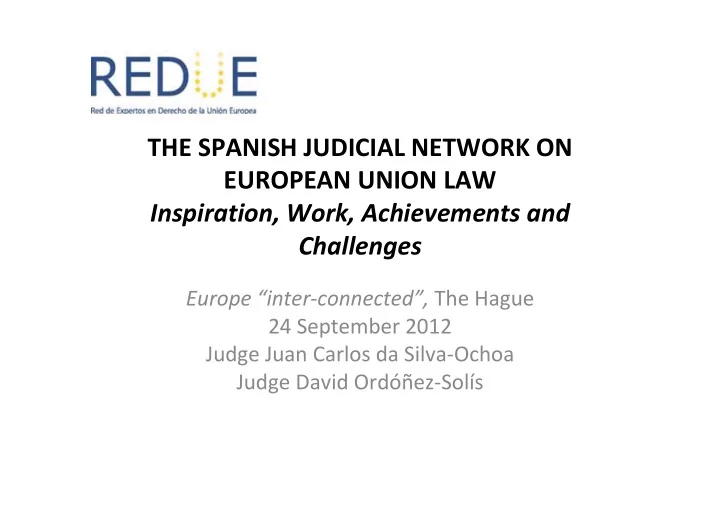

THE SPANISH JUDICIAL NETWORK ON EUROPEAN UNION LAW Inspiration, Work, Achievements and Challenges Europe “inter ‐ connected”, The Hague 24 September 2012 Judge Juan Carlos da Silva ‐ Ochoa Judge David Ordóñez ‐ Solís
INTRODUCTION • Revolutionary changes in the Spanish Judicial World • The Constitution of 1978: fundamental rights (Constitutional Court and European Court of Human Rights) • The accession of Spain to the European Communities in 1986 (European Court of Justice) Judges’ attitude regarding EU Law (1986 ‐ 2005) • • Enthusiasm of Lower Courts • Some misunderstandings and reserves of Highest Courts • Reluctance to make references for a preliminary rulings
INTRODUCTION 2006: Spanish Council for Judiciary set up the Judicial Network on • the European Union • Improvement of the sensitivity of the Spanish Judges regarding the European Union Law Analysis of the Spanish Network: • • Inspiration • How does it work • Which the achievements are • Challenges to be taken according to another National and European Networks.
INSPIRING THE NETWORK • Dámaso Ruiz ‐ Jarabo, former Spanish Advocate General in the European Court of Justice • Spanish Council for Judiciary: on 17 May 2006 set up the Spanish Judicial Network on European Union Law (Red de Expertos en Derecho de la Unión Europea ‐ REDUE) • Reason: lack of references for a preliminary ruling made by Spanish Judges From 1986 to 1995 the yearly average was of five references (1, 1, 1, 2, 6, 5, 5, 7, 13 and 10) • From 1996 to 2005 it gave an annual average of 11 references (6, 9, 55, 4, 5, 4, 3, 8, 8 and 10) • Different attitudes • Administrative Chamber of the Supreme Court: first reference for preliminary ruling in 1991 • Civil Chamber of the Supreme Court: first reference in 2008 • Criminal Chamber of the Supreme Court: it has not yet needed to make a reference •
INSPIRING THE NETWORK • Network’s members: 10 specialised judges • Call for applications: Judges are appointed for five years (2006 ‐ 2011 and 2012 ‐ 2016) • Five Sections Competition, Intellectual, Industrial and Commercial Property: 2 Civil (Commercial) Judges Consumer and Civil Law: 2 Civil Judges Section on the Area of Freedom, Security and Justice: 2 Criminal Judges Section Fiscal and Administrative Law: 2 Administrative Judges Section on Labour Law and Social Security: 2 Labour Judges
WORKING IN THE NETWORK • The duties of the Network members INFORMATION: Provide all necessary cooperation to Spanish Courts and Tribunals in the location, interpretation and application of EU Law and the Court of Justice case law, paying special attention to the preliminary ruling procedures. TRAINING: Promote and participate in the training activities on EU Law and the Court of Justice case law. REPORTING: Draw up reports, documents and suggest alternative instruments aimed at the dissemination and knowledge of EU Law and the Court of Justice case law. • Institutional structure • No structure (Sections) • One judge acting as a leading coordinator • The link with the Spanish Council for the Judiciary (International Relations Service)
WORKING IN THE NETWORK Tasks developed by the members of the Network • To promote references for preliminary rulings • To give European information regarding judges through the Judicial Documentation Service • To facilitate European training through the Spanish Judicial School • • Promoting references for a preliminary ruling Formally through the Network • Informally through personal contacts of each member of this Network • Official website intranet www.poderjudicial.es • Automatic application requesting information • Practical notes about the proceedings in the references for a preliminary ruling • Data base on those references that are pending and those that already have been answered •
CHALLENGING THE FUTURE • Achievements of the Network • Judicial statistical data from 2006 to 2011: increasing of the references for a preliminary ruling 18 references yearly (17, 14, 17, 11, 22 and 27) • Renewal of the Highest Courts : some members who have been appointed to the Supreme Court (Labour Chamber, Civil Chamber and Administrative Chamber) • European case ‐ law is transforming the Spanish Law Administrative Law : reviewing Spanish regulations according to the European legislation • Labor and administrative Law : workers and civil servants’ rights regarding working time , fixed ‐ • term work, seniority of interim civil servants and the right to paid public and private employees’ annual leave Civil Law : consumers’ rights and the active role attributed to national courts • Commercial Law : Private competition law and rights to compensation and assistance to • passengers in flights Criminal Law : European Area of Freedom, Security and Justice is gradually affecting family and • criminal matters Constitutional Law : Spanish Constitutional Court has made its first reference for a preliminary • ruling concerning the interpretation of the EU Charter of Fundamental Rights in a criminal case
CHALLENGING THE FUTURE Challenges for the future of the Spanish Network • Information • This is not a question of more information but of improving the quality of European information • From references for a preliminary ruling to the actions for failure of a Member State to fulfill its obligations Training • Young judges • European mainstream in training • Online training Cooperation • National cooperation: other Spanish networks, Spanish Ministry of Justice. • European cooperation: the Dutch initiative on (CCE-network)
CONCLUSION • Nothing regarding the European Court of Justice or the European Union Law would be unfamiliar to judges • Implication of all jurisdictions and all judicial levels, including the Constitutional Court and the Supreme Court • Specialization within each jurisdiction: extraordinary impact of the European Union Law in Spain • A comprehensive approach to the interpretation of the European Union Law
www.poderjudicial.es
Recommend
More recommend